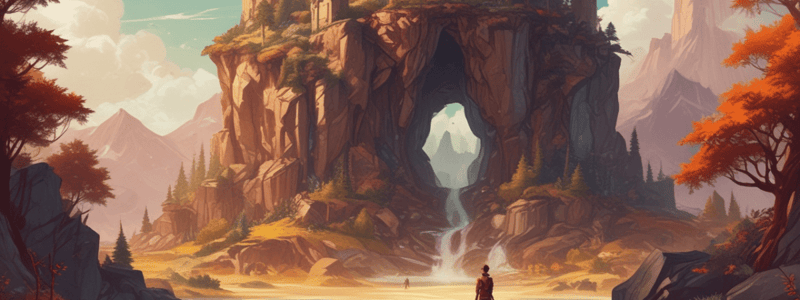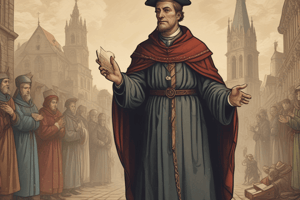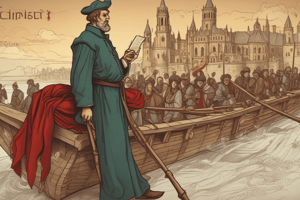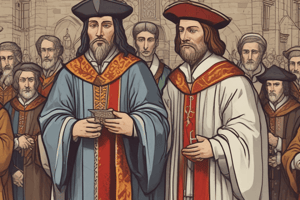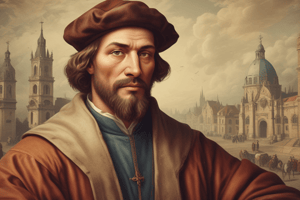Podcast
Questions and Answers
When did the Protestant Revolution begin?
When did the Protestant Revolution begin?
- 1600
- 1500
- 1517 (correct)
- 1550
What was a result of the Protestant Reformation?
What was a result of the Protestant Reformation?
- The Protestant Church was formed
- The pope lost some of his power (correct)
- The Jesuits were abolished
- The Catholic Church gained more power
Who was a French theologian who believed in predestination?
Who was a French theologian who believed in predestination?
- Leo X
- Pope Francis
- Martin Luther
- John Calvin (correct)
What was the primary concern of Martin Luther that led to the Protestant Reformation?
What was the primary concern of Martin Luther that led to the Protestant Reformation?
What was the outcome for women as a result of the Protestant Reformation?
What was the outcome for women as a result of the Protestant Reformation?
What was the Catholic Church's response to the Protestant Reformation?
What was the Catholic Church's response to the Protestant Reformation?
What was the main belief of Protestants?
What was the main belief of Protestants?
What was the role of the family in the Protestant Reformation?
What was the role of the family in the Protestant Reformation?
What was the outcome for peasants after the Protestant Reformation?
What was the outcome for peasants after the Protestant Reformation?
What was the purpose of the Anabaptists' beliefs?
What was the purpose of the Anabaptists' beliefs?
What were the two main watchwords of the Protestant Reformation?
What were the two main watchwords of the Protestant Reformation?
What was the main goal of Ignatius of Loyola when he founded the Jesuits?
What was the main goal of Ignatius of Loyola when he founded the Jesuits?
What was the main consequence of the Age of Exploration on Native American societies?
What was the main consequence of the Age of Exploration on Native American societies?
What was the name of the process by which people, diseases, plants, and animals were exchanged between the Old and New World?
What was the name of the process by which people, diseases, plants, and animals were exchanged between the Old and New World?
What was the main motivation for Prince Henry the Navigator's explorations?
What was the main motivation for Prince Henry the Navigator's explorations?
What was the outcome of the 30 Years War?
What was the outcome of the 30 Years War?
What was the term used to describe the era of European exploration and discovery?
What was the term used to describe the era of European exploration and discovery?
Who was the Spanish explorer who claimed Florida for Spain?
Who was the Spanish explorer who claimed Florida for Spain?
What was one of the positive consequences of the Age of Exploration?
What was one of the positive consequences of the Age of Exploration?
What was the term used to describe the Americas in Latin?
What was the term used to describe the Americas in Latin?
Who formulated the heliocentric model?
Who formulated the heliocentric model?
What was Galileo Galilei pioneering the development of?
What was Galileo Galilei pioneering the development of?
What was Isaac Newton famous for formulating?
What was Isaac Newton famous for formulating?
What area of study was developed by Vesalius?
What area of study was developed by Vesalius?
What was the key factor that led to the development of medicine and chemistry as disciplines?
What was the key factor that led to the development of medicine and chemistry as disciplines?
What period saw medicine and chemistry come into their own as disciplines?
What period saw medicine and chemistry come into their own as disciplines?
What was the focus of scientists during this period?
What was the focus of scientists during this period?
What was a key component of the scientific method during this period?
What was a key component of the scientific method during this period?
What was the result of the scientific advancements of this period?
What was the result of the scientific advancements of this period?
Why was Galileo Galilei condemned by the Catholic Church?
Why was Galileo Galilei condemned by the Catholic Church?
What were some of the items that the explorers brought back to the Old World from the New World?
What were some of the items that the explorers brought back to the Old World from the New World?
What was the main idea behind mercantilism?
What was the main idea behind mercantilism?
What was the result of the flow of wealth from the colonies into the Iberian Peninsula of Spain and Portugal?
What was the result of the flow of wealth from the colonies into the Iberian Peninsula of Spain and Portugal?
What was the key to the Scientific Revolution?
What was the key to the Scientific Revolution?
Who is credited with developing the scientific method?
Who is credited with developing the scientific method?
What was the consequence of the Scientific Revolution?
What was the consequence of the Scientific Revolution?
What was the transatlantic slave trade?
What was the transatlantic slave trade?
What was the Silk Road?
What was the Silk Road?
What was the result of the Columbian Exchange?
What was the result of the Columbian Exchange?
What was the climax of the Scientific Revolution?
What was the climax of the Scientific Revolution?
What were the two fundamental principles of the Protestant Reformation?
What were the two fundamental principles of the Protestant Reformation?
What was the response of the Catholic Church to the Protestant Reformation?
What was the response of the Catholic Church to the Protestant Reformation?
What was the name of the process of exchanging goods and people between the Old and New Worlds?
What was the name of the process of exchanging goods and people between the Old and New Worlds?
What was the name of the explorer who claimed North America for the English crown?
What was the name of the explorer who claimed North America for the English crown?
What was one of the negative consequences of the Age of Exploration?
What was one of the negative consequences of the Age of Exploration?
What was the term used to describe the Americas in Latin?
What was the term used to describe the Americas in Latin?
What was the main motivation behind Prince Henry the Navigator's explorations?
What was the main motivation behind Prince Henry the Navigator's explorations?
What was the outcome of the 30 Years War?
What was the outcome of the 30 Years War?
What was the name of the era in history when European explorers began traveling to other continents?
What was the name of the era in history when European explorers began traveling to other continents?
What was the primary goal of Ignatius of Loyola when he founded the Jesuits?
What was the primary goal of Ignatius of Loyola when he founded the Jesuits?
What was the primary motivation behind the Protestant Reformation?
What was the primary motivation behind the Protestant Reformation?
Which group of people carried on the causes of the Protestant Reformation?
Which group of people carried on the causes of the Protestant Reformation?
What was the focus of the Protestant Reformation?
What was the focus of the Protestant Reformation?
What was the outcome of the Protestant Reformation for the Catholic Church?
What was the outcome of the Protestant Reformation for the Catholic Church?
What was a consequence of the Protestant Reformation for society?
What was a consequence of the Protestant Reformation for society?
What was the purpose of the Council of Trent?
What was the purpose of the Council of Trent?
What was the Catholic Church's counter-movement to the Protestant Reformation?
What was the Catholic Church's counter-movement to the Protestant Reformation?
What was the result of the Protestant Reformation for the peasantry?
What was the result of the Protestant Reformation for the peasantry?
What was the focus of the Anabaptists' beliefs?
What was the focus of the Anabaptists' beliefs?
What was the outcome of the Protestant Reformation for nationally based Christian sects?
What was the outcome of the Protestant Reformation for nationally based Christian sects?
What was the main contribution of Nicolaus Copernicus to astronomy?
What was the main contribution of Nicolaus Copernicus to astronomy?
Who was condemned by the Catholic Church for supporting the heliocentric model?
Who was condemned by the Catholic Church for supporting the heliocentric model?
What was the main area of focus for Isaac Newton?
What was the main area of focus for Isaac Newton?
What was the key factor that led to the development of medicine and chemistry as disciplines?
What was the key factor that led to the development of medicine and chemistry as disciplines?
During which period did medicine and chemistry come into their own as disciplines?
During which period did medicine and chemistry come into their own as disciplines?
What was the focus of scientists during the 16th and 17th centuries?
What was the focus of scientists during the 16th and 17th centuries?
What was a key component of the scientific method during this period?
What was a key component of the scientific method during this period?
What was the result of the scientific advancements of this period?
What was the result of the scientific advancements of this period?
Who developed human anatomy as a science?
Who developed human anatomy as a science?
What was the main area of focus for Galileo Galilei?
What was the main area of focus for Galileo Galilei?
What was the main goal of the explorers during the Age of Exploration?
What was the main goal of the explorers during the Age of Exploration?
What was the outcome of the flow of wealth from the colonies into the Iberian Peninsula of Spain and Portugal?
What was the outcome of the flow of wealth from the colonies into the Iberian Peninsula of Spain and Portugal?
What was the key to the Scientific Revolution?
What was the key to the Scientific Revolution?
What was the consequence of the Scientific Revolution?
What was the consequence of the Scientific Revolution?
What was the main idea behind mercantilism?
What was the main idea behind mercantilism?
What was the transatlantic slave trade?
What was the transatlantic slave trade?
What was the Silk Road?
What was the Silk Road?
What was the result of the Columbian Exchange?
What was the result of the Columbian Exchange?
What was the main focus of scientists during the Scientific Revolution?
What was the main focus of scientists during the Scientific Revolution?
Who is credited with formulating the heliocentric model?
Who is credited with formulating the heliocentric model?
Flashcards are hidden until you start studying
Study Notes
The Protestant Revolution
- The Protestant Revolution began in 1517 when Martin Luther published his Ninety-Five Theses, leading to a significant change in European society.
- The Reformation had positive results, including an increased emphasis on education for boys and girls and a focus on independent thought.
- Women gained new rights, such as the right to divorce and marry.
- The family became the center of life, and the Protestant Reformation brought attention to the corrupt practices of the Roman Catholic Church.
The Protestant Reformation
- The Protestant Reformation was an attempt by nationally based Christian sects to break away from the Catholic Church and establish their own churches.
- The watchwords of the Protestant Reformation were "sola scriptura" and "sola fide," meaning faith alone and scripture alone.
- The Protestant Reformation caused revolts against the existing social order and wars between Catholics and Protestants.
The Catholic Reformation
- The Catholic Reformation was the Roman Catholic Church's counter-movement to address the concerns of Martin Luther and other religious reformers.
- The Council of Trent was convened to respond to the Protestant Reformation.
- The Jesuits were a religious group created during the Catholic Reformation to engage in extensive missionary activity for Catholicism.
The Age of Exploration
- The Age of Exploration was a time when European explorers travelled to other continents, especially the Americas, also known as the Age of Discovery.
- Christopher Columbus rediscovered the Americas in 1492, leading to the Columbian Exchange (the exchange of people, diseases, plants, and animals from one side of the Atlantic to the other).
- Other notable explorers included John Cabot, Vasco Nunez de Balboa, and Ponce de Leon.
The Columbian Exchange
- The Columbian Exchange was an exchange of plants, fruits, vegetables, disease, and other items between the Old World and the New World.
- The exchange brought new foods from the Americas, but also led to the destruction of many Native American societies.
- The Columbian Exchange also led to the transatlantic slave trade, where European countries traded resources for enslaved people in a triangular fashion.
Key Terms
- Commerce refers to buying and selling, trading, or any other kind of economic transaction.
- The Silk Road was a series of trade routes extending between Europe and East Asia.
- The Age of Exploration was an era characterized by global European exploration lasting between the 15th and 18th centuries.
- Mercantilism was an economic philosophy in which a country seeks to amass as much raw wealth as possible.
The Scientific Revolution
- The Scientific Revolution was a movement that marked a change in the way of thinking, from the 16th to the 18th centuries.
- The scientific method was developed to ensure that the generation of new knowledge was valid.
- The Scientific Revolution led to the Enlightenment and undermined the influence of the Catholic Church and the monarchies.
- The Scientific Revolution saw great progress in sciences like astronomy, mathematics, physics, and biology.
Notable Scientists
- Nicolaus Copernicus published "On the Revolutions of the Heavenly Spheres," where he formulated his heliocentric model.
- Galileo Galilei pioneered the development of the model telescope and supported the heliocentric model.
- Isaac Newton formulated the Laws of Motion and his Law of Universal Gravity.
- Vesalius developed human anatomy as a science.
Medicine and Chemistry
- The 16th and 17th centuries saw medicine and chemistry come into their own as disciplines.
- The increased emphasis on empiricism by scientists of the period led to pioneering dissections, experimentation, and dedication to notation and observation.
The Protestant Revolution
- The Protestant Revolution began in 1517 when Martin Luther published his Ninety-Five Theses, leading to a significant change in European society.
- The Reformation had positive results, including an increased emphasis on education for boys and girls and a focus on independent thought.
- Women gained new rights, such as the right to divorce and marry.
- The family became the center of life, and the Protestant Reformation brought attention to the corrupt practices of the Roman Catholic Church.
The Protestant Reformation
- The Protestant Reformation was an attempt by nationally based Christian sects to break away from the Catholic Church and establish their own churches.
- The watchwords of the Protestant Reformation were "sola scriptura" and "sola fide," meaning faith alone and scripture alone.
- The Protestant Reformation caused revolts against the existing social order and wars between Catholics and Protestants.
The Catholic Reformation
- The Catholic Reformation was the Roman Catholic Church's counter-movement to address the concerns of Martin Luther and other religious reformers.
- The Council of Trent was convened to respond to the Protestant Reformation.
- The Jesuits were a religious group created during the Catholic Reformation to engage in extensive missionary activity for Catholicism.
The Age of Exploration
- The Age of Exploration was a time when European explorers travelled to other continents, especially the Americas, also known as the Age of Discovery.
- Christopher Columbus rediscovered the Americas in 1492, leading to the Columbian Exchange (the exchange of people, diseases, plants, and animals from one side of the Atlantic to the other).
- Other notable explorers included John Cabot, Vasco Nunez de Balboa, and Ponce de Leon.
The Columbian Exchange
- The Columbian Exchange was an exchange of plants, fruits, vegetables, disease, and other items between the Old World and the New World.
- The exchange brought new foods from the Americas, but also led to the destruction of many Native American societies.
- The Columbian Exchange also led to the transatlantic slave trade, where European countries traded resources for enslaved people in a triangular fashion.
Key Terms
- Commerce refers to buying and selling, trading, or any other kind of economic transaction.
- The Silk Road was a series of trade routes extending between Europe and East Asia.
- The Age of Exploration was an era characterized by global European exploration lasting between the 15th and 18th centuries.
- Mercantilism was an economic philosophy in which a country seeks to amass as much raw wealth as possible.
The Scientific Revolution
- The Scientific Revolution was a movement that marked a change in the way of thinking, from the 16th to the 18th centuries.
- The scientific method was developed to ensure that the generation of new knowledge was valid.
- The Scientific Revolution led to the Enlightenment and undermined the influence of the Catholic Church and the monarchies.
- The Scientific Revolution saw great progress in sciences like astronomy, mathematics, physics, and biology.
Notable Scientists
- Nicolaus Copernicus published "On the Revolutions of the Heavenly Spheres," where he formulated his heliocentric model.
- Galileo Galilei pioneered the development of the model telescope and supported the heliocentric model.
- Isaac Newton formulated the Laws of Motion and his Law of Universal Gravity.
- Vesalius developed human anatomy as a science.
Medicine and Chemistry
- The 16th and 17th centuries saw medicine and chemistry come into their own as disciplines.
- The increased emphasis on empiricism by scientists of the period led to pioneering dissections, experimentation, and dedication to notation and observation.
Studying That Suits You
Use AI to generate personalized quizzes and flashcards to suit your learning preferences.
